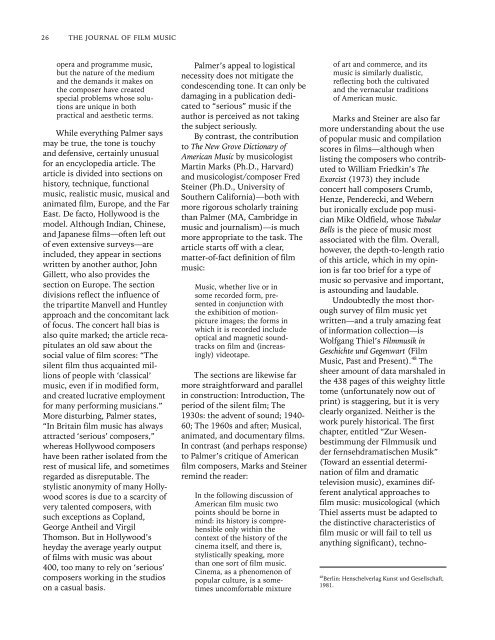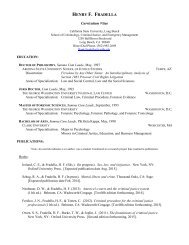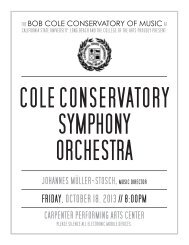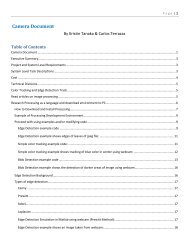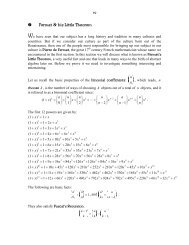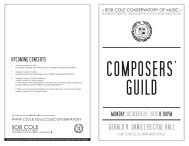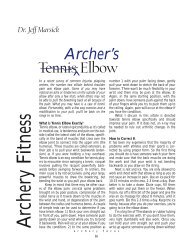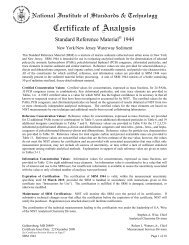Music in Films: A Critical Review of Literature - California State ...
Music in Films: A Critical Review of Literature - California State ...
Music in Films: A Critical Review of Literature - California State ...
You also want an ePaper? Increase the reach of your titles
YUMPU automatically turns print PDFs into web optimized ePapers that Google loves.
26 THE JOURNAL OF FILM MUSIC<br />
opera and programme music,<br />
but the nature <strong>of</strong> the medium<br />
and the demands it makes on<br />
the composer have created<br />
special problems whose solutions<br />
are unique <strong>in</strong> both<br />
practical and aesthetic terms.<br />
While everyth<strong>in</strong>g Palmer says<br />
may be true, the tone is touchy<br />
and defensive, certa<strong>in</strong>ly unusual<br />
for an encyclopedia article. The<br />
article is divided <strong>in</strong>to sections on<br />
history, technique, functional<br />
music, realistic music, musical and<br />
animated film, Europe, and the Far<br />
East. De facto, Hollywood is the<br />
model. Although Indian, Ch<strong>in</strong>ese,<br />
and Japanese films—<strong>of</strong>ten left out<br />
<strong>of</strong> even extensive surveys—are<br />
<strong>in</strong>cluded, they appear <strong>in</strong> sections<br />
written by another author, John<br />
Gillett, who also provides the<br />
section on Europe. The section<br />
divisions reflect the <strong>in</strong>fluence <strong>of</strong><br />
the tripartite Manvell and Huntley<br />
approach and the concomitant lack<br />
<strong>of</strong> focus. The concert hall bias is<br />
also quite marked; the article recapitulates<br />
an old saw about the<br />
social value <strong>of</strong> film scores: “The<br />
silent film thus acqua<strong>in</strong>ted millions<br />
<strong>of</strong> people with ‘classical’<br />
music, even if <strong>in</strong> modified form,<br />
and created lucrative employment<br />
for many perform<strong>in</strong>g musicians.”<br />
More disturb<strong>in</strong>g, Palmer states,<br />
“In Brita<strong>in</strong> film music has always<br />
attracted ‘serious’ composers,”<br />
whereas Hollywood composers<br />
have been rather isolated from the<br />
rest <strong>of</strong> musical life, and sometimes<br />
regarded as disreputable. The<br />
stylistic anonymity <strong>of</strong> many Hollywood<br />
scores is due to a scarcity <strong>of</strong><br />
very talented composers, with<br />
such exceptions as Copland,<br />
George Antheil and Virgil<br />
Thomson. But <strong>in</strong> Hollywood’s<br />
heyday the average yearly output<br />
<strong>of</strong> films with music was about<br />
400, too many to rely on ‘serious’<br />
composers work<strong>in</strong>g <strong>in</strong> the studios<br />
on a casual basis.<br />
Palmer’s appeal to logistical<br />
necessity does not mitigate the<br />
condescend<strong>in</strong>g tone. It can only be<br />
damag<strong>in</strong>g <strong>in</strong> a publication dedicated<br />
to “serious” music if the<br />
author is perceived as not tak<strong>in</strong>g<br />
the subject seriously.<br />
By contrast, the contribution<br />
to The New Grove Dictionary <strong>of</strong><br />
American <strong>Music</strong> by musicologist<br />
Mart<strong>in</strong> Marks (Ph.D., Harvard)<br />
and musicologist/composer Fred<br />
Ste<strong>in</strong>er (Ph.D., University <strong>of</strong><br />
Southern <strong>California</strong>)—both with<br />
more rigorous scholarly tra<strong>in</strong><strong>in</strong>g<br />
than Palmer (MA, Cambridge <strong>in</strong><br />
music and journalism)—is much<br />
more appropriate to the task. The<br />
article starts <strong>of</strong>f with a clear,<br />
matter-<strong>of</strong>-fact def<strong>in</strong>ition <strong>of</strong> film<br />
music:<br />
<strong>Music</strong>, whether live or <strong>in</strong><br />
some recorded form, presented<br />
<strong>in</strong> conjunction with<br />
the exhibition <strong>of</strong> motionpicture<br />
images; the forms <strong>in</strong><br />
which it is recorded <strong>in</strong>clude<br />
optical and magnetic soundtracks<br />
on film and (<strong>in</strong>creas<strong>in</strong>gly)<br />
videotape.<br />
The sections are likewise far<br />
more straightforward and parallel<br />
<strong>in</strong> construction: Introduction, The<br />
period <strong>of</strong> the silent film; The<br />
1930s: the advent <strong>of</strong> sound; 1940-<br />
60; The 1960s and after; <strong>Music</strong>al,<br />
animated, and documentary films.<br />
In contrast (and perhaps response)<br />
to Palmer’s critique <strong>of</strong> American<br />
film composers, Marks and Ste<strong>in</strong>er<br />
rem<strong>in</strong>d the reader:<br />
In the follow<strong>in</strong>g discussion <strong>of</strong><br />
American film music two<br />
po<strong>in</strong>ts should be borne <strong>in</strong><br />
m<strong>in</strong>d: its history is comprehensible<br />
only with<strong>in</strong> the<br />
context <strong>of</strong> the history <strong>of</strong> the<br />
c<strong>in</strong>ema itself, and there is,<br />
stylistically speak<strong>in</strong>g, more<br />
than one sort <strong>of</strong> film music.<br />
C<strong>in</strong>ema, as a phenomenon <strong>of</strong><br />
popular culture, is a sometimes<br />
uncomfortable mixture<br />
<strong>of</strong> art and commerce, and its<br />
music is similarly dualistic,<br />
reflect<strong>in</strong>g both the cultivated<br />
and the vernacular traditions<br />
<strong>of</strong> American music.<br />
Marks and Ste<strong>in</strong>er are also far<br />
more understand<strong>in</strong>g about the use<br />
<strong>of</strong> popular music and compilation<br />
scores <strong>in</strong> films—although when<br />
list<strong>in</strong>g the composers who contributed<br />
to William Friedk<strong>in</strong>’s The<br />
Exorcist (1973) they <strong>in</strong>clude<br />
concert hall composers Crumb,<br />
Henze, Penderecki, and Webern<br />
but ironically exclude pop musician<br />
Mike Oldfield, whose Tubular<br />
Bells is the piece <strong>of</strong> music most<br />
associated with the film. Overall,<br />
however, the depth-to-length ratio<br />
<strong>of</strong> this article, which <strong>in</strong> my op<strong>in</strong>ion<br />
is far too brief for a type <strong>of</strong><br />
music so pervasive and important,<br />
is astound<strong>in</strong>g and laudable.<br />
Undoubtedly the most thorough<br />
survey <strong>of</strong> film music yet<br />
written—and a truly amaz<strong>in</strong>g feat<br />
<strong>of</strong> <strong>in</strong>formation collection—is<br />
Wolfgang Thiel’s Filmmusik <strong>in</strong><br />
Geschichte und Gegenwart (Film<br />
<strong>Music</strong>, Past and Present). 48 The<br />
sheer amount <strong>of</strong> data marshaled <strong>in</strong><br />
the 438 pages <strong>of</strong> this weighty little<br />
tome (unfortunately now out <strong>of</strong><br />
pr<strong>in</strong>t) is stagger<strong>in</strong>g, but it is very<br />
clearly organized. Neither is the<br />
work purely historical. The first<br />
chapter, entitled “Zur Wesenbestimmung<br />
der Filmmusik und<br />
der fernsehdramatischen Musik”<br />
(Toward an essential determ<strong>in</strong>ation<br />
<strong>of</strong> film and dramatic<br />
television music), exam<strong>in</strong>es different<br />
analytical approaches to<br />
film music: musicological (which<br />
Thiel asserts must be adapted to<br />
the dist<strong>in</strong>ctive characteristics <strong>of</strong><br />
film music or will fail to tell us<br />
anyth<strong>in</strong>g significant), techno-<br />
48<br />
Berl<strong>in</strong>: Henschelverlag Kunst und Gesellschaft,<br />
1981.


